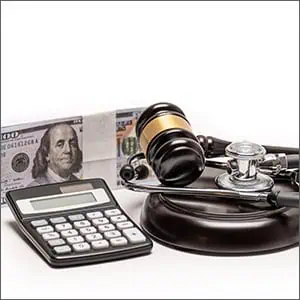
When an attorney’s negligence causes you financial or personal harm, it’s not just frustrating; it’s a violation of the very trust they were supposed to uphold. With this comes very real consequences. Understanding your rights as you set out on a malpractice claim in Louisiana is the first step toward holding your former lawyer accountable and recovering your losses. In this article, you’ll learn…
Louisiana courts evaluate financial damages in legal malpractice lawsuits by asking one core question: what would the outcome have been if your attorney had performed their duties correctly? In line with this, the court considers what you actually lost as a result of your attorney’s negligence.
This includes direct financial losses, such as lost settlements or judgments you should have won, increased legal expenses, missed business opportunities, and additional costs incurred, like legal fees paid to rectify the attorney’s mistakes. The overarching goal is to place the client in the position they would have been in had the malpractice never occurred.
To do this, courts rely on evidence like financial records, expert testimony, and case history to estimate the difference between the real outcome and what should have occurred had proper legal care been provided.
In some cases, you can indeed get compensation for emotional distress in a Louisiana legal malpractice claim. This is especially true if the distress you suffered is significant and clearly stems from your attorney’s negligence.
Know, however, that emotional distress claims are significantly harder to prove and typically require very strong documentation, such as medical records, psychological evaluations, and testimony, all of which serve to demonstrate how the experience harmed your mental health.
Courts are more likely to award emotional damages when the malpractice involved a betrayal of trust, personal humiliation, or contributed to life-changing consequences like incarceration, the loss of a home, or the loss of child custody.
Louisiana doesn’t cap damages in legal malpractice cases like some states do, but you still must prove your losses with clarity and evidence. Some damages, like emotional distress or reputational harm, may be harder to quantify, and courts tend to be conservative in awarding them unless the harm is extreme. Also, if you’re found partially at fault, for example, if you failed to provide your lawyer with key information, your compensation may be reduced under Louisiana’s comparative fault system.
Losing your case is not a requirement for a malpractice lawsuit in Louisiana. If your attorney’s misconduct or incompetence caused you to suffer financial loss, even if you technically won your case, you may still have a valid claim.
For example, if you secured a settlement that was for less than what you could have received due to missed deadlines, poor legal advice, or conflicts of interest, you may be entitled to damages. The focus is on the measurable harm caused, not the outcome.
If you were wrongfully convicted because of your attorney’s negligence, whether from failing to introduce critical evidence, advising a wrongful guilty plea, or violating ethical rules, you may be eligible for a wide range of damages.
These can include compensation for loss of freedom, missed wages during incarceration, emotional trauma, legal fees for appeals, and long-term damage to your personal and professional reputation. Louisiana courts may also consider the social stigma and future impact on housing, employment, and relationships when awarding you damages.
Partnering with a wrongful conviction lawyer for malpractice in Louisiana is key to effectively navigating these situations, given how nuanced they can be.
Yes, you can recover damages if your lawyer’s mistakes led to being convicted of a crime, but there are very important conditions. To pursue a malpractice claim related to a criminal conviction, you generally must first obtain post-conviction relief. This may look like a reversal of your conviction, a dismissal, or a finding of actual innocence.
Once your conviction is overturned, you may pursue a malpractice case to recover damages you’ve suffered. Courts typically want to ensure that the conviction itself was wrongful and that the attorney’s actions were a direct cause of it before moving forward with a malpractice claim.